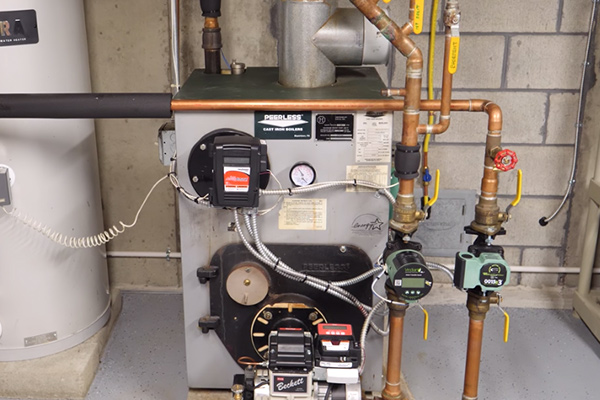Condensing vs. Non-Condensing Boilers: What’s the Difference?

Choosing the right boiler is crucial for efficient heating. With various options available, it’s essential to understand their differences to make an informed decision. McAllister Energy stands at the forefront of HVAC solutions, offering expert guidance and top-notch services. This article aims to educate homeowners and businesses on the key differences between condensing vs non-condensing boilers, helping you select the perfect fit for your heating needs. Let’s dive into the world of boilers and discover how McAllister Energy can assist you in making the best choice for your home.
Basics of Boilers
Contents
Boilers are the heart of many heating systems, providing warmth to homes and businesses alike. Essentially, a boiler is a device that heats water or other fluids to produce steam or hot water for heating. This heated fluid is then circulated through radiators or underfloor systems to distribute heat evenly throughout a space.
The history of boiler technology is a journey of innovation and improvement. From the early days of simple, coal-fired designs to today’s sophisticated, energy-efficient models, boilers have evolved significantly. This evolution has been driven by advances in materials, design, and technology, leading to more effective, safer, and environmentally friendly heating solutions. As we explore the differences between condensing and non-condensing boilers, remember that each represents a step in this ongoing journey of technological advancement.
What are Non-Condensing Boilers?
Non-condensing boilers, a traditional heating solution, burn fuel to heat water, releasing hot flue gases through a chimney and losing some heat in the process. Unlike condensing boilers, they don’t reuse this heat, making them less efficient. The common types include conventional boilers, suitable for homes with high water demands due to their separate hot water cylinder and storage tank; system boilers, which integrate most components for space-saving; and combi boilers, providing both heating and hot water directly, ideal for smaller spaces.
These boilers are known for their simplicity, ease of maintenance, and affordability, particularly in older buildings. However, their energy efficiency is lower (around 80-90%), leading to higher operational costs and greater environmental impact compared to condensing boilers. McAllister Energy recommends considering these aspects along with individual needs and the potential long-term benefits of higher efficiency when choosing a boiler.
What are Condensing Boilers?
Condensing boilers are a modern, highly efficient type of boiler. They capture and reuse heat from water vapor in exhaust gases, a feature that sets them apart from non-condensing boilers. This process allows them to achieve efficiencies of 90% or higher, making them more effective at converting fuel into usable heat. Their design includes a condenser and a second heat exchanger, enabling this higher efficiency.
Despite their higher upfront cost and the potential need for property modifications, such as a new flue system, the long-term benefits of condensing boilers are significant. They not only reduce energy bills but also lessen environmental impact by emitting fewer greenhouse gases. McAllister Energy suggests weighing these factors alongside your heating requirements and existing system setup to determine if a condensing boiler is the right investment for your needs.
Comparative Analysis: Condensing Vs Non-Condensing Boilers
Non-Condensing Boilers

Ideal for areas with low water pressure or properties requiring simpler installations, non-condensing boilers are more affordable upfront and easier to install, especially in older buildings. They typically reach 80-90% efficiency, losing some heat through flue gases. However, they have a higher environmental footprint due to lower efficiency and are simpler to maintain.
Condensing Boilers
Best for those prioritizing energy efficiency, condensing boilers are suitable for a wide range of climates and boast over 90% efficiency by recovering heat from exhaust gases. While they have a higher upfront cost and may require more extensive installation and maintenance, they are more cost-effective in the long run and environmentally friendly, with lower greenhouse gas emissions. Both boiler types offer similar lifespans and durability, and McAllister Energy can assist in determining the best fit based on local conditions and needs.
Making the Right Choice for Your Needs

When choosing the right boiler for your property, it’s essential to weigh factors like building size, climate, and budget. Larger spaces often require a more powerful boiler, and in colder regions, a more efficient system like a condensing boiler can be cost-effective over time. However, initial costs are higher for condensing boilers, despite their long-term savings. McAllister Energy assists in this selection process by evaluating your property’s size, insulation, and heating needs, along with local climate conditions. Our experts provide a comprehensive cost-benefit analysis, ensuring the boiler you choose fits both your immediate budget and long-term financial goals.
With McAllister Energy’s expertise, choosing the right boiler becomes a straightforward process, tailored to meet your unique needs and ensure optimal comfort and efficiency in your home or business.
Boiler Maintenance & Care Tips
Regular maintenance is key to ensuring that your boiler, whether condensing or non-condensing, operates efficiently and has a long lifespan. Here are some guidelines and tips:
- Annual Servicing: Have a qualified technician, like those from McAllister Energy, service your boiler annually. This checkup includes cleaning, inspecting, and testing all components to ensure they’re functioning correctly.
- Check the Pressure: Regularly monitor the boiler’s pressure gauge. Low pressure can indicate leaks or other issues, while high pressure can stress your boiler system.
- Inspect for Leaks: Regularly inspect around and under the boiler for any signs of water leaks, which can indicate a problem.
- Keep Vents and Flues Clear: Ensure that all vents and flues are unobstructed to maintain proper airflow and efficiency.
- Monitor for Strange Noises: Unusual sounds from the boiler can indicate issues like air in the system or scale buildup.
Tips for Prolonging Boiler Life & Maintaining Efficiency
- Bleed Radiators: Bleed your radiators annually to remove air pockets that reduce heating efficiency.
- Maintain Good Water Quality: Ensure the water in your boiler is of good quality. Hard water can cause scale buildup, reducing efficiency. Consider installing a water softener if necessary.
- Insulate Pipes: Insulate your boiler’s pipes to prevent heat loss and freezing in colder months.
- Upgrade Thermostats and Controls: Consider upgrading to smart thermostats and programmable controls for more efficient operation.
- Regular Cleaning: Keep the boiler and its surrounding area clean from dust and debris.
McAllister Energy offers comprehensive maintenance services and can provide personalized advice on caring for your specific boiler model. Regular maintenance not only prolongs the life of your boiler but also ensures it runs at peak efficiency, saving you money and keeping your space comfortably heated.
Conclusion
In summary, choosing between condensing vs non-condensing boilers hinges on understanding their efficiency, cost, environmental impact, and suitability for your specific needs. Condensing boilers offer higher efficiency and environmental benefits, while non-condensing boilers are known for their simplicity and lower initial cost. Whatever your choice, it’s crucial to consider long-term savings and compatibility with your heating requirements. For tailored advice and comprehensive solutions, don’t hesitate to contact McAllister Energy. Our expertise ensures you make the best, most informed decision for your heating needs.
Call McAllister Energy For All Your Home Heating Needs
For all your HVAC and oil delivery needs, contact McAllister Energy. We have some of the most highly qualified and professionally certified technicians in Southern New Jersey. Each of our friendly techs can conduct all kinds of HVAC services, such as oil tank upgrades, boiler installs, ductless repairs, and more.
We also offer various oil delivery plans and financing options. This way, you can customize your fuel deliveries to meet your needs. Our heating oil delivery and HVAC services are affordable and are done accurately and promptly at all times.
All of our services come with a guarantee. Our HVAC maintenance services improve your energy efficiency and home comfort while decreasing your HVAC costs. We can also assist you when you need to replace your heating and cooling system. We will help you find the best make and model for your home without sacrificing your budget. Our experts have the skills, training, and experience to ensure that all your home comfort needs are met. Book an appointment with us today. Call McAllister Energy for a free, in-home estimate.
You can click here to contact us now or call us at (856) 665-4545 to find out more! Click the link to view our service area.

Related Articles: